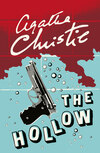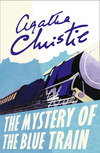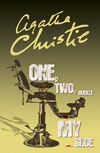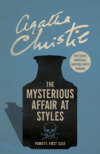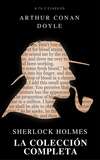Kitabı oku: «Lord Edgware Dies», sayfa 2
I looked at the three other members of the party. Mr and Mrs Widburn, what about them? He was a tall cadaverous man, she a plump, fair, gushing soul. They appeared to be wealthy people with a passion for everything connected with the stage. They were in fact, unwilling to talk on any other subject. Owing to my recent absence from England they found me sadly ill-informed, and finally Mrs Widburn turned a plump shoulder on me and remembered my existence no more.
The last member of the party was the dark young man with the round cheerful face who was Carlotta Adams’ escort. I had had my suspicions from the first that the young man was not quite so sober as he might have been. As he drank more champagne this became even more clearly apparent.
He appeared to be suffering from a profound sense of injury. For the first half of the meal he sat in gloomy silence. Towards the latter half he unbosomed himself to me apparently under the impression that I was one of his oldest friends.
‘What I mean to say,’ he said. ‘It isn’t. No, dear old chap, it isn’t—’
I omit the slight slurring together of the words.
‘I mean to say,’ he went on, ‘I ask you? I mean if you take a girl—well, I mean—butting in. Going round upsetting things. Not as though I’d ever said a word to her I shouldn’t have done. She’s not the sort. You know—Puritan fathers—the Mayflower—all that. Dash it—the girl’s straight. What I mean is—what was I saying?’
‘That it was hard lines,’ I said soothingly.
‘Well, dash it all, it is. Dash it, I had to borrow the money for this beano from my tailor. Very obliging chap, my tailor. I’ve owed him money for years. Makes a sort of bond between us. Nothing like a bond, is there, dear old fellow. You and I. You and I. Who the devil are you, by the way?’
‘My name is Hastings.’
‘You don’t say so. Now I could have sworn you were a chap called Spencer Jones. Dear old Spencer Jones. Met him at the Eton and Harrow and borrowed a fiver from him. What I say is one face is very like another face—that’s what I say. If we were all Chinese we wouldn’t know each other apart.’
He shook his head sadly, then cheered up suddenly and drank off some more champagne.
‘Look on the bright side, my boy,’ he adjured me. ‘What I say is, look on the bright side. One of these days—when I’m seventy-five or so, I’m going to be a rich man. When my uncle dies. Then I can pay my tailor.’
He sat smiling happily at the thought.
There was something strangely likeable about the young man. He had a round face and an absurdly small black moustache that gave one the impression of being marooned in the middle of a desert.
Carlotta Adams, I noticed, had an eye on him, and it was after a glance in his direction that she rose and broke up the party.
‘It was just sweet of you to come up here,’ said Jane. ‘I do so love doing things on the spur of the moment, don’t you?’
‘No,’ said Miss Adams. ‘I’m afraid I always plan a thing out very carefully before I do it. It saves—worry.’
There was something faintly disagreeable in her manner.
‘Well, at any rate the results justify you,’ laughed Jane. ‘I don’t know when I enjoyed anything so much as I did your show tonight.’
The American girl’s face relaxed.
‘Well, that’s very sweet of you,’ she said warmly. ‘And I guess I appreciate your telling me so. I need encouragement. We all do.’
‘Carlotta,’ said the young man with the black moustache. ‘Shake hands and say thank you for the party to Aunt Jane and come along.’
The way he walked straight through the door was a miracle of concentration. Carlotta followed him quickly.
‘Well,’ said Jane, ‘what was that that blew in and called me Aunt Jane? I hadn’t noticed him before.’
‘My dear,’ said Mrs Widburn. ‘You mustn’t take any notice of him. Most brilliant as a boy in the O.U.D.S. You’d hardly think so now, would you? I hate to see early promise come to nothing. But Charles and I positively must toddle.’
The Widburns duly toddled and Bryan Martin went with them.
‘Well, M. Poirot?’
He smiled at her.
‘Eh bien, Lady Edgware?’
‘For goodness’ sake, don’t call me that. Let me forget it! If you aren’t the hardest-hearted little man in Europe!’
‘But no, but no, I am not hard-hearted.’
Poirot, I thought, had had quite enough champagne, possibly a glass too much.
‘Then you’ll go and see my husband? And make him do what I want?’
‘I will go and see him,’ Poirot promised cautiously.
‘And if he turns you down—as he will—you’ll think of a clever plan. They say you’re the cleverest man in England, M. Poirot.’
‘Madame, when I am hard-hearted, it is Europe you mention. But for cleverness you say only England.’
‘If you put this through I’ll say the universe.’
Poirot raised a deprecating hand.
‘Madame, I promise nothing. In the interests of the psychology I will endeavour to arrange a meeting with your husband.’
‘Psycho-analyse him as much as you like. Maybe it would do him good. But you’ve got to pull it off—for my sake. I’ve got to have my romance, M. Poirot.’
She added dreamily: ‘Just think of the sensation it will make.’
CHAPTER 3
The Man with the Gold Tooth
It was a few days later, when we were sitting at breakfast, that Poirot flung across to me a letter that he had just opened.
‘Well, mon ami,’ he said. ‘What do you think of that?’
The note was from Lord Edgware and in stiff formal language it made an appointment for the following day at eleven.
I must say that I was very much surprised. I had taken Poirot’s words as uttered lightly in a convivial moment, and I had had no idea that he had actually taken steps to carry out his promise.
Poirot, who was very quick-witted, read my mind and his eyes twinkled a little.
‘But yes, mon ami, it was not solely the champagne.’
‘I didn’t mean that.’
‘But yes—but yes—you thought to yourself, the poor old one, he has the spirit of the party, he promises things that he will not perform—that he has no intention of performing. But, my friend, the promises of Hercule Poirot are sacred.’
He drew himself up in a stately manner as he said the last words. ‘Of course. Of course. I know that,’ I said hastily. ‘But I thought that perhaps your judgment was slightly—what shall I say—influenced.’
‘I am not in the habit of letting my judgment be “influenced” as you call it, Hastings. The best and driest of champagne, the most golden-haired and seductive of women—nothing influences the judgment of Hercule Poirot. No, mon ami, I am interested—that is all.’
‘In Jane Wilkinson’s love affair?’
‘Not exactly that. Her love affair, as you call it, is a very commonplace business. It is a step in the successful career of a very beautiful woman. If the Duke of Merton had neither a title nor wealth his romantic likeness to a dreamy monk would no longer interest the lady. No, Hastings, what intrigues me is the psychology of the matter. The interplay of character. I welcome the chance of studying Lord Edgware at close quarters.’
‘You do not expect to be successful in your mission?’
‘Pourquoi pas? Every man has his weak spot. Do not imagine, Hastings, that because I am studying the case from a psychological standpoint, I shall not try my best to succeed in the commission entrusted to me. I always enjoy exercising my ingenuity.’
I had feared an allusion to the little grey cells and was thankful to be spared it.
‘So we go to Regent Gate at eleven tomorrow?’ I said.
‘We?’ Poirot raised his eyebrows quizzically.
‘Poirot!’ I cried. ‘You are not going to leave me behind. I always go with you.’
‘If it were a crime, a mysterious poisoning case, an assassination—ah! these are the things your soul delights in. But a mere matter of social adjustment?’
‘Not another word,’ I said determinedly. ‘I’m coming.’
Poirot laughed gently, and at that moment we were told that a gentleman had called.
To our great surprise our visitor proved to be Bryan Martin.
The actor looked older by daylight. He was still handsome, but it was a kind of ravaged handsomeness. It flashed across my mind that he might conceivably take drugs. There was a kind of nervous tension about him that suggested the possibility.
‘Good morning, M. Poirot,’ he said in a cheerful manner. ‘You and Captain Hastings breakfast at a reasonable hour, I am glad to see. By the way, I suppose you are very busy just now?’
Poirot smiled at him amiably.
‘No,’ he said. ‘At the moment I have practically no business of importance on hand.’
‘Come now,’ laughed Bryan. ‘Not called in by Scotland Yard? No delicate matters to investigate for Royalty? I can hardly believe it.’
‘You confound fiction with reality, my friend,’ said Poirot, smiling. ‘I am, I assure you, at the moment completely out of work, though not yet on the dole. Dieu merci.’
‘Well, that’s luck for me,’ said Bryan with another laugh. ‘Perhaps you’ll take on something for me.’
Poirot considered the young man thoughtfully.
‘You have a problem for me—yes?’ he said in a minute or two.
‘Well—it’s like this. I have and I haven’t.’
This time his laugh was rather nervous. Still considering him thoughtfully, Poirot indicated a chair. The young man took it. He sat facing us, for I had taken a seat by Poirot’s side.
‘And now,’ said Poirot, ‘let us hear all about it.’
Bryan Martin still seemed to have a little difficulty in getting under way.
‘The trouble is that I can’t tell you quite as much as I’d like to.’ He hesitated. ‘It’s difficult. You see, the whole business started in America.’
‘In America? Yes?’
‘A mere incident first drew my attention to it. As a matter of fact, I was travelling by train and I noticed a certain fellow. Ugly little chap, clean-shaven, glasses, and a gold tooth.’
‘Ah! a gold tooth.’
‘Exactly. That’s really the crux of the matter.’
Poirot nodded his head several times.
‘I begin to comprehend. Go on.’
‘Well, as I say. I just noticed the fellow. I was travelling, by the way, to New York. Six months later I was in Los Angeles, and I noticed the fellow again. Don’t know why I should have—but I did. Still, nothing in that.’
‘Continue.’
‘A month afterwards I had occasion to go to Seattle, and shortly after I got there who should I see but my friend again, only this time he wore a beard.’
‘Distinctly curious.’
‘Wasn’t it? Of course I didn’t fancy it had anything to do with me at that time, but when I saw the man again in Los Angeles, beardless, in Chicago with a moustache and different eyebrows and in a mountain village disguised as a hobo—well, I began to wonder.’
‘Naturally.’
‘And at last—well, it seemed odd—but not a doubt about it. I was being what you call shadowed.’
‘Most remarkable.’
‘Wasn’t it? After that I made sure of it. Wherever I was, there, somewhere near at hand, was my shadow made up in different disguises. Fortunately, owing to the gold tooth, I could always spot him.’
‘Ah! that gold tooth, it was a very fortunate occurrence.’
‘It was.’
‘Pardon me, M. Martin, but did you never speak to the man? Question him as to the reason of his persistent shadowing?’
‘No, I didn’t.’ The actor hesitated. ‘I thought of doing so once or twice, but I always decided against it. It seemed to me that I should merely put the fellow on his guard and learn nothing. Possibly once they had discovered that I had spotted him, they would have put someone else on my track—someone whom I might not recognize.’
‘En effet…someone without that useful gold tooth.’
‘Exactly. I may have been wrong—but that’s how I figured it out.’
‘Now, M. Martin, you referred to “they” just now. Whom did you mean by “they”?’
‘It was a mere figure of speech used for convenience. I assumed—I don’t know why—a nebulous “they” in the background.’
‘Have you any reason for that belief?’
‘None.’
‘You mean you have no conception of who could want you shadowed or for what purpose?’
‘Not the slightest idea. At least—’
‘Continuez,’ said Poirot encouragingly.
‘I have an idea,’ said Bryan Martin slowly. ‘It’s a mere guess on my part, mind.’
‘A guess may be very successful sometimes, Monsieur.’
‘It concerns a certain incident that took place in London about two years ago. It was a slight incident, but an inexplicable and an unforgettable one. I’ve often wondered and puzzled over it. Just because I could find no explanation of it at the time, I am inclined to wonder if this shadowing business might not be connected in some way with it—but for the life of me I can’t see why or how.’
‘Perhaps I can.’
‘Yes, but you see—’ Bryan Martin’s embarrassment returned. ‘The awkward thing is that I can’t tell you about it—not now, that is. In a day or so I might be able to.’
Stung into further speech by Poirot’s inquiring glance he continued desperately.
‘You see—a girl was concerned in it.’
‘Ah! parfaitement! An English girl?’
‘Yes. At least—why?’
‘Very simple. You cannot tell me now, but you hope to do so in a day or two. That means that you want to obtain the consent of the young lady. Therefore she is in England. Also, she must have been in England during the time you were shadowed, for if she had been in America you would have sought her out then and there. Therefore, since she has been in England for the last eighteen months she is probably, though not certainly, English. It is good reasoning that, eh?’
‘Rather. Now tell me, M. Poirot, if I get her permission, will you look into the matter for me?’
There was a pause. Poirot seemed to be debating the matter in his mind. Finally he said:
‘Why have you come to me before going to her?’
‘Well, I thought—’ he hesitated. ‘I wanted to persuade her to—to clear things up—I mean to let things be cleared up by you. What I mean is, if you investigate the affair, nothing need be made public, need it?’
‘That depends,’ said Poirot calmly.
‘What do you mean?’
‘If there is any question of crime—’
‘Oh! there’s no crime concerned.’
‘You do not know. There may be.’
‘But you would do your best for her—for us?’
‘That, naturally.’
He was silent for a moment and then said:
‘Tell me, this follower of yours—this shadow—of what age was he?’
‘Oh! quite youngish. About thirty.’
‘Ah!’ said Poirot. ‘That is indeed remarkable. Yes, that makes the whole thing very much more interesting.’
I stared at him. So did Bryan Martin. This remark of his was, I am sure, equally inexplicable to us both. Bryan questioned me with a lift of his eyebrows. I shook my head.
‘Yes,’ murmured Poirot. ‘It makes the whole story very interesting.’
‘He may have been older,’ said Bryan doubtfully, ‘but I don’t think so.’
‘No, no, I am sure your observation is quite accurate, M. Martin. Very interesting—extraordinarily interesting.’
Rather taken aback by Poirot’s enigmatical words, Bryan Martin seemed at a loss what to say or do next. He started making desultory conversation.
‘An amusing party the other night,’ he said. ‘Jane Wilkinson is the most high-handed woman that ever existed.’
‘She has the single vision,’ said Poirot, smiling. ‘One thing at a time.’
‘She gets away with it, too,’ said Martin. ‘How people stand it, I don’t know!’
‘One will stand a good deal from a beautiful woman, my friend,’ said Poirot with a twinkle. ‘If she had the pug nose, the sallow skin, the greasy hair, then—ah! then she would not “get away with it” as you put it.’
‘I suppose not,’ conceded Bryan. ‘But it makes me mad sometimes. All the same, I’m devoted to Jane, though in some ways, mind you, I don’t think she’s quite all there.’
‘On the contrary, I should say she was very much on the spot.’
‘I don’t mean that, exactly. She can look after her interests all right. She’s got plenty of business shrewdness. No, I meant morally.’
‘Ah! morally.’
‘She’s what they call amoral. Right and wrong don’t exist for her.’
‘Ah! I remember you said something of the kind the other evening.’
‘We were talking of crime just now—’
‘Yes, my friend?’
‘Well, it would never surprise me if Jane committed a crime.’
‘And you should know her well,’ murmured Poirot thoughtfully. ‘You have acted much with her, have you not?’
‘Yes. I suppose I know her through and through and up and down. I can see her killing anybody quite easily.’
‘Ah! she has the hot temper, yes?’
‘No, no, not at all. Cool as a cucumber. I mean if anyone were in her way she’d just remove them—without a thought. And one couldn’t really blame her—morally, I mean. She’d just think that anyone who interfered with Jane Wilkinson had got to go.’
There was a bitterness in his last words that had been lacking heretofore. I wondered what memory he was recalling.
‘You think she would do—murder?’
Poirot watched him intently.
Bryan drew a deep breath.
‘Upon my soul, I do. Perhaps one of these days, you’ll remember my words… I know her, you see. She’d kill as easily as she’d drink her morning tea. I mean it, M. Poirot.’
He had risen to his feet.
‘Yes,’ said Poirot quietly. ‘I can see you mean it.’
‘I know her,’ said Bryan Martin again, ‘through and through.’
He stood frowning for a minute, then with a change of tone, he said:
‘As to this business we’ve been talking about, I’ll let you know, M. Poirot, in a few days. You will undertake it, won’t you?’
Poirot looked at him for a moment or two without replying.
‘Yes,’ he said at last. ‘I will undertake it. I find it—interesting.’
There was something queer in the way he said the last word. I went downstairs with Bryan Martin. At the door he said to me:
‘Did you get the hang of what he meant about that fellow’s age? I mean, why was it interesting that he should be about thirty? I didn’t get the hang of that at all.’
‘No more did I,’ I admitted.
‘It doesn’t seem to make sense. Perhaps he was just having a game with me.’
‘No,’ I said. ‘Poirot is not like that. Depend upon it, the point has significance since he says so.’
‘Well, blessed if I can see it. Glad you can’t either. I’d hate to feel I was a complete mutt.’
He strode away. I rejoined my friend.
‘Poirot,’ I said. ‘What was the point about the age of the shadower?’
‘You do not see? My poor Hastings!’ He smiled and shook his head. Then he asked: ‘What did you think of our interview on the whole?’
‘There’s so little to go upon. It seems difficult to say. If we knew more—’
‘Even without knowing more, do not certain ideas suggest themselves to you, mon ami?’
The telephone ringing at that moment saved me from the ignominy of admitting that no ideas whatever suggested themselves to me. I took up the receiver.
A woman’s voice spoke, a crisp, clear efficient voice.
‘This is Lord Edgware’s secretary speaking. Lord Edgware regrets that he must cancel the appointment with M. Poirot for tomorrow morning. He has to go over to Paris tomorrow unexpectedly. He could see M. Poirot for a few minutes at a quarter-past twelve this morning if that would be convenient.’
I consulted Poirot.
‘Certainly, my friend, we will go there this morning.’
I repeated this into the mouthpiece.
‘Very good,’ said the crisp business-like voice. ‘A quarter-past twelve this morning.’
She rang off.
CHAPTER 4
An Interview
I arrived with Poirot at Lord Edgware’s house in Regent Gate in a very pleasant state of anticipation. Though I had not Poirot’s devotion to ‘the psychology’, yet the few words in which Lady Edgware had referred to her husband had aroused my curiosity. I was anxious to see what my own judgment would be.
The house was an imposing one—well-built, handsome and slightly gloomy. There were no window-boxes or such frivolities.
The door was opened to us promptly, and by no aged white-haired butler such as would have been in keeping with the exterior of the house. On the contrary, it was opened by one of the handsomest young men I have ever seen. Tall, fair, he might have posed to a sculptor for Hermes or Apollo. Despite his good looks there was something vaguely effeminate that I disliked about the softness of his voice. Also, in a curious way, he reminded me of someone—someone, too, whom I had met quite lately—but who it was I could not for the life of me remember.
We asked for Lord Edgware.
‘This way, sir.’
He led us along the hall, past the staircase, to a door at the rear of the hall.
Opening it, he announced us in that same soft voice which I instinctively distrusted.
The room into which we were shown was a kind of library. The walls were lined with books, the furnishings were dark and sombre but handsome, the chairs were formal and not too comfortable.
Lord Edgware, who rose to receive us, was a tall man of about fifty. He had dark hair streaked with grey, a thin face and a sneering mouth. He looked bad-tempered and bitter. His eyes had a queer secretive look about them. There was something, I thought, distinctly odd about those eyes.
His manner was stiff and formal.
‘M. Hercule Poirot? Captain Hastings? Please be seated.’
We sat down. The room felt chilly. There was little light coming in from the one window and the dimness contributed to the cold atmosphere.
Lord Edgware had taken up a letter which I saw to be in my friend’s handwriting.
‘I am familiar, of course, with your name, M. Poirot. Who is not?’ Poirot bowed at the compliment. ‘But I cannot quite understand your position in this matter. You say that you wish to see me on behalf of’—he paused—‘my wife.’
He said the last two words in a peculiar way—as though it were an effort to get them out.
‘That is so,’ said my friend.
‘I understood that you were an investigator of—crime, M. Poirot?’
‘Of problems, Lord Edgware. There are problems of crime, certainly. There are other problems.’
‘Indeed. And what may this one be?’
The sneer in his words was palpable by now. Poirot took no notice of it.
‘I have the honour to approach you on behalf of Lady Edgware,’ he said. ‘Lady Edgware, as you may know, desires—a divorce.’
‘I am quite aware of that,’ said Lord Edgware coldly.
‘Her suggestion was that you and I should discuss the matter.’
‘There is nothing to discuss.’
‘You refuse, then?’
‘Refuse? Certainly not.’
Whatever else Poirot had expected, he had not expected this. It is seldom that I have seen my friend utterly taken aback, but I did on this occasion. His appearance was ludicrous. His mouth fell open, his hands flew out, his eyebrows rose. He looked like a cartoon in a comic paper.
‘Comment?’ he cried. ‘What is this? You do not refuse?’
‘I am at a loss to understand your astonishment, M. Poirot.’
‘Ecoutez, you are willing to divorce your wife?’
‘Certainly I am willing. She knows that perfectly well. I wrote and told her so.’
‘You wrote and told her so?’
‘Yes. Six months ago.’
‘But I do not understand. I do not understand at all.’ Lord Edgware said nothing.
‘I understood that you were opposed to the principle of divorce.’
‘I do not see that my principles are your business, M. Poirot. It is true that I did not divorce my first wife. My conscience would not allow me to do so. My second marriage, I will admit frankly, was a mistake. When my wife suggested a divorce, I refused point blank. Six months ago she wrote to me again urging the point. I have an idea she wanted to marry again—some film actor or fellow of that kind. My views had, by this time, undergone modification. I wrote to her at Hollywood telling her so. Why she has sent you to me I cannot imagine. I suppose it is a question of money.’
His lips sneered again as he said the last words.
‘Extremely curious,’ muttered Poirot. ‘Extremely curious. There is something here I do not understand at all.’
‘As regards money,’ went on Lord Edgware. ‘I have no intention of making any financial arrangement. My wife deserted me of her own accord. If she wishes to marry another man, I can set her free to do so, but there is no reason why she should receive a penny from me and she will not do so.’
‘There is no question of any financial arrangement.’
Lord Edgware raised his eyebrows.
‘Jane must be marrying a rich man,’ he murmured cynically.
‘There is something here that I do not understand,’ said Poirot. His face was perplexed and wrinkled with the effort of thought. ‘I understood from Lady Edgware that she had approached you repeatedly through lawyers?’
‘She did,’ replied Lord Edgware dryly. ‘English lawyers, American lawyers, every kind of lawyer, down to the lowest kind of scallywag. Finally, as I say, she wrote to me herself.’
‘You having previously refused?’
‘That is so.’
‘But on receiving her letter, you changed your mind. Why did you change your mind, Lord Edgware?’
‘Not on account of anything in that letter,’ he said sharply. ‘My views happened to have changed, that is all.’
‘The change was somewhat sudden.’
Lord Edgware did not reply.
‘What special circumstance brought about your change of mind, Lord Edgware?’
‘That, really, is my own business M. Poirot. I cannot enter into that subject. Shall we say that gradually I had perceived the advantages of severing what—you will forgive my plain speaking—I considered a degrading association. My second marriage was a mistake.’
‘Your wife says the same,’ said Poirot softly.
‘Does she?’
There was a queer flicker for a moment in his eyes, but it was gone almost at once.
He rose with an air of finality and as we said goodbye his manner became less unbending.
‘You must forgive my altering the appointment. I have to go over to Paris tomorrow.’
‘Perfectly—perfectly.’
‘A sale of works of art as a matter of fact. I have my eye on a little statuette—a perfect thing in its way—a macabre way, perhaps. But I enjoy the macabre. I always have. My taste is peculiar.’
Again that queer smile. I had been looking at the books in the shelves near. There were the memoirs of Casanova, also a volume on the Comte de Sade, another on medieval tortures.
I remembered Jane Wilkinson’s little shudder as she spoke of her husband. That had not been acting. That had been real enough. I wondered exactly what kind of a man George Alfred St Vincent Marsh, fourth Baron Edgware, was.
Very suavely he bid us farewell, touching the bell as he did so. We went out of the door. The Greek god of a butler was waiting in the hall. As I closed the library door behind me, I glanced back into the room. I almost uttered an exclamation as I did so.
That suave smiling face was transformed. The lips were drawn back from the teeth in a snarl, the eyes were alive with fury and an almost insane rage.
I wondered no longer that two wives had left Lord Edgware. What I did marvel at was the iron self-control of the man. To have gone through that interview with such frozen self-control, such aloof politeness!
Just as we reached the front door, a door on the right opened. A girl stood at the doorway of the room, shrinking back a little as she saw us.
She was a tall slender girl, with dark hair and a white face. Her eyes, dark and startled, looked for a moment into mine. Then, like a shadow, she shrank back into the room again, closing the door.
A moment later we were out in the street. Poirot hailed a taxi. We got in and he told the man to drive to the Savoy.
‘Well, Hastings,’ he said with a twinkle, ‘that interview did not go at all as I figured to myself it would.’
‘No, indeed. What an extraordinary man Lord Edgware is.’
I related to him how I had looked back before closing the door of the study and what I had seen. He nodded his head slowly and thoughtfully.
‘I fancy that he is very near the border line of madness, Hastings. I should imagine he practises many curious vices, and that beneath his frigid exterior he hides a deep-rooted instinct of cruelty.’
‘It is no wonder both his wives left him.’
‘As you say.’
‘Poirot, did you notice a girl as we were coming out? A dark girl with a white face.’
‘Yes, I noticed her, mon ami. A young lady who was frightened and not happy.’
His voice was grave.
‘Who do you think she was?’
‘Probably his daughter. He has one.’
‘She did look frightened,’ I said slowly. ‘That house must be a gloomy place for a young girl.’
‘Yes, indeed. Ah! here we are, mon ami. Now to acquaint her ladyship with the good news.’
Jane was in, and after telephoning, the clerk informed us that we were to go up. A page-boy took us to the door.
It was opened by a neat middle-aged woman with glasses and primly arranged grey hair. From the bedroom Jane’s voice, with its husky note, called to her.
‘Is that M. Poirot, Ellis? Make him sit right down. I’ll find a rag to put on and be there in a moment.’
Jane Wilkinson’s idea of a rag was a gossamer negligée which revealed more than it hid. She came in eagerly, saying: ‘Well?’
Poirot rose and bowed over her hand.
‘Exactly the word, Madame, it is well.’
‘Why—how do you mean?’
‘Lord Edgware is perfectly willing to agree to a divorce.’
‘What?’
Either the stupefaction on her face was genuine, or else she was indeed a most marvellous actress.
‘M. Poirot! You’ve managed it! At once! Like that! Why, you’re a genius. How in mercy’s name did you set about it?’
‘Madame, I cannot take compliments where they are not earned. Six months ago your husband wrote to you withdrawing his opposition.’
‘What’s that you say? Wrote to me? Where?’
‘It was when you were at Hollywood, I understand.’


